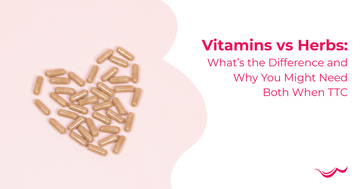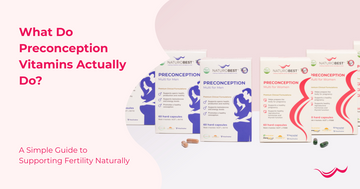Hypothyroidism & its Impact on Fertility
by NaturoBest Naturopath Team on Jul 17, 2023

Hypothyroidism occurs when the thyroid gland becomes underactive and produces insufficient amounts of thyroid hormones. This can affect metabolism, energy levels, and reproductive health, including fertility.
Understanding Thyroid Function
Thyroid Stimulating Hormone (TSH) is produced by the brain to stimulate the thyroid gland to produce thyroxine (T4). T4 is then converted in peripheral tissues into triiodothyronine (T3) the active form of thyroid hormone responsible for regulating energy metabolism and cellular function.
When the thyroid fails to produce enough T4 and T3, or when the conversion process is impaired, the result is hypothyroidism.
Common Symptoms of Hypothyroidism
- Fatigue or low energy
- Weight gain or difficulty losing weight
- Brain fog, poor concentration, or memory issues
- Joint or muscle aches
- Sensitivity to cold
- Dry skin, brittle nails, thinning hair, or hair loss
- Heavy or irregular menstrual cycles
- Infertility or recurrent miscarriage
- Slow heart rate
- Depression or low mood
If you’re experiencing several of these symptoms, it’s worth discussing thyroid testing with your healthcare provider.
Testing for Thyroid Function
Doctors commonly test TSH as the primary screening tool, but this alone doesn’t give the full picture. It’s possible to have a “normal” TSH result while still having low T3 or T4 or the presence of thyroid antibodies, indicating autoimmune thyroid disease.
Comprehensive thyroid testing should ideally include:
- TSH
- Free T3
- Free T4
- Thyroid antibodies (TPO and TgAb)
If your GP is unable to request these additional markers, a naturopath or integrative practitioner can organise private testing through a pathology laboratory.
Why Hypothyroidism Matters for Fertility
Hypothyroidism can affect fertility in multiple ways. The thyroid plays a crucial role in reproductive hormone balance, ovulation, and uterine health. Low thyroid function can:
- Disrupt ovulation, leading to irregular or absent menstrual cycles
- Reduce progesterone production
- Affect implantation and early embryo development
- Increase the risk of miscarriage, stillbirth, and preterm delivery if unmanaged during pregnancy
Research shows that maternal hypothyroidism may also affect a baby’s neurological development, leading to an increased risk of learning difficulties and lower IQ later in life.
Supporting Thyroid Health Naturally
The good news is that hypothyroidism can be supported through a combination of dietary, lifestyle, and nutritional strategies, alongside medical treatment if prescribed.
1. Manage Stress and Cortisol Levels
Chronic stress increases cortisol, which can interfere with thyroid hormone production and conversion. High stress can also suppress ovulation and worsen fatigue.
To reduce stress:
- Practise mindfulness or meditation
- Try journalling or breathing exercises
- Seek professional support from a counsellor or psychologist
- Incorporate gentle exercise and adequate rest
Herbal adaptogens such as Withania somnifera (Ashwagandha) can support adrenal balance and help regulate the body’s stress response.
2. Address Nutrient Deficiencies
Certain nutrients are essential for healthy thyroid hormone production and metabolism, including:
- Iodine – required for the synthesis of T3 and T4
- Zinc – assists in converting T4 to active T3
- Selenium – supports antioxidant protection within the thyroid and conversion of thyroid hormones
Our Preconception Multi for Women includes these key nutrients in bioavailable forms, helping to optimise thyroid function and support reproductive health.
3. Support Healthy Weight and Metabolism
Hypothyroidism often slows metabolism, making it more difficult to maintain a healthy weight.
To support metabolic health:
- Eat balanced, nutrient-dense meals with plenty of whole foods
- Increase fibre intake through fruits, vegetables, legumes, and seeds
- Reduce processed foods, refined sugar, alcohol, and trans fats
- Avoid smoking and minimise exposure to environmental chemicals
- Engage in regular physical activity appropriate to your energy levels
For additional support, herbal ingredients such as Gymnema sylvestre and Bladderwrack, found in our Metabolism & Thermogenic AM Formula may assist in supporting healthy metabolism, thermogenesis, and balanced energy levels.
The Link Between Hypothyroidism and Preconception Health
When preparing for pregnancy, managing thyroid function is essential. Unaddressed hypothyroidism can affect ovulation, conception, and embryo implantation.
If you are planning to conceive:
- Ensure you complete full thyroid testing before trying for a baby.
- Begin a preconception care plan at least three to four months before conception.
- Take a high-quality multivitamin with iodine, selenium, zinc, and activated B vitamins to support thyroid and reproductive health.
Working with your healthcare provider or naturopath can help tailor your plan and ensure optimal thyroid hormone balance before and during pregnancy.
In Summary
Hypothyroidism can significantly affect both fertility and pregnancy outcomes, but with the right approach including testing, nutrient support, stress management, and lifestyle changes you can take control of your thyroid health.
Supporting thyroid balance not only helps improve fertility outcomes but also contributes to overall wellbeing, energy, and hormonal harmony.
Always read the label and follow the directions for use. Consult your healthcare professional before beginning any new supplement.
References
- Koyyada, A., & Orsu, P. (2020). Role of hypothyroidism and associated pathways in pregnancy and infertility: Clinical insights. Tzu Chi Medical Journal, 32(4), 312–317.
- Verma, I., Sood, R., Juneja, S., & Kaur, S. (2012). Prevalence of hypothyroidism in infertile women and evaluation of response of treatment for hypothyroidism on infertility. International Journal of Applied & Basic Medical Research, 2(1), 17–19.
- Sanyal, D., & Raychaudhuri, M. (2016). Hypothyroidism and obesity: An intriguing link. Indian Journal of Endocrinology and Metabolism, 20(4), 554–557.
- Sarkar, D. (2012). Recurrent pregnancy loss in patients with thyroid dysfunction. Indian Journal of Endocrinology and Metabolism, 16(Suppl 2), S350–S351.




